Of all the creatures that live and breathe and creep on the earth, we humans are weakest.
-Book 18, line 130
Homer
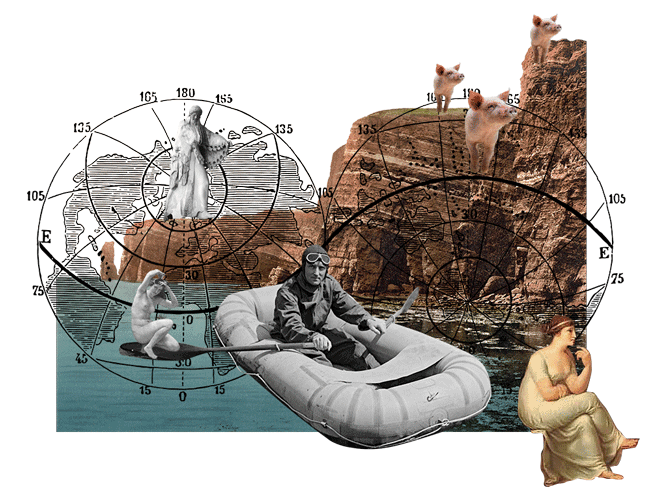
The Odyssey
Homer
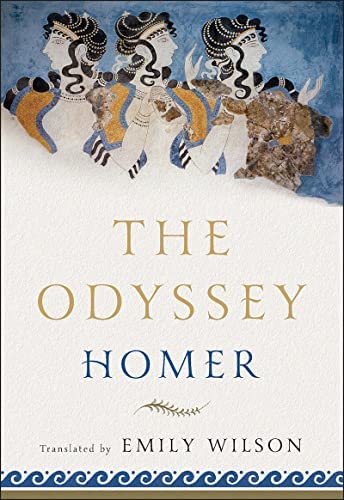
Translated by Emily Wilson, published by Norton, ISBN: 9780393356250
Homer’s Odyssey is an epic poem about the beautiful and painful mess of being human.
The poem tells of Odysseus’ long journey home after an equally long time fighting in a forign war. The story begins with the perspective of Odysseus’ 20 year-old son, Telemachus, who had never met his father, as he searches for information about him and his own identity, while suitors threaten his mother, his inheritance and his pride. The poem travels a thrilling non-linear narrative through the exploits and adventures of Odysseus as he finds his way home. He is a man of many skills and desires, through whom Homer gives a clear voice to the conflicting passions and motivations that make our lives as human beings so extraordinarily complicated, painful and beautiful. This is a living story that continues to inspire works of contemporary art and interpretation, linking the past with the present while inviting new readers to interpret it for the future.
Why This Text is Transformative?
Many first-year students see themselves in Telemachus, who is struggling to find his identity and to establish himself in the world as an independent person, worthy of respect and happiness.
Discussing The Odyssey is a productive way to begin an undergraduate education. Many first-year students see themselves in Telemachus, who is struggling to find his identity and to establish himself in the world as an independent person, worthy of respect and happiness. This text helps frame the transformative experience of beginning college through a narrative following the personal transformations of many characters. The text productivity raises questions about the conflict between safety and freedom, desire and devotion and helps students weigh their competing priorities as they begin their college journey. Students in HUMA 1301: Great Questions Seminar at Austin Community College in Austin, TX begin their first-year required Student Success Course through the discussion based exploration of this text and report that their experience with this poem is meaningful and inspiring. For many students in this course, The Odyssey is the first “big book” that they have ever read, and completing it provides them with a great deal of pride and satisfaction, which is a transformative experience in its own right. This text is unique in its depth but also in its accessibility for students of a wide range of academic preparedness. At Austin Community College, students who are required to enroll in developmental reading and writing courses have become stronger readers, writers and reasoners while co-registered in a Great Questions Seminar.
A Focused Selection
Study Questions
Class 1: Books 5-8
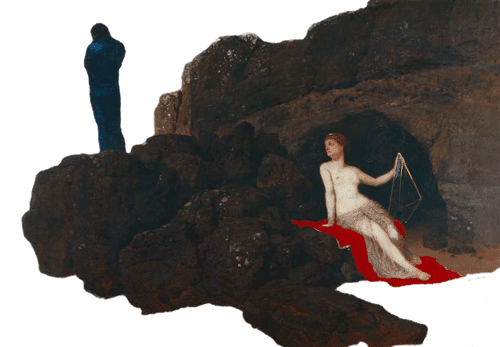
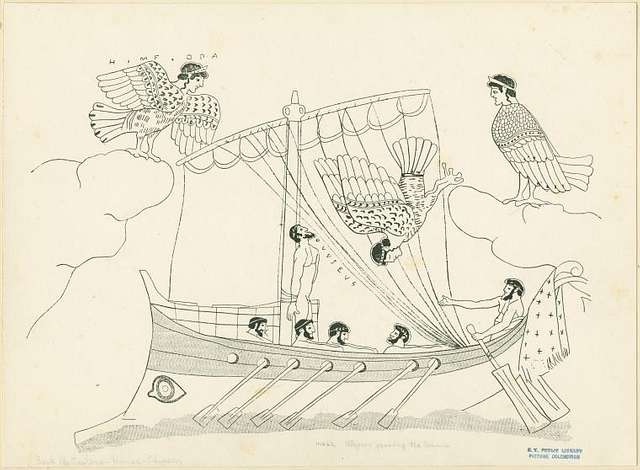
The following selection of Odyssey Books 5-12 could be productively explored with students over the course of two class meetings of about 120min each or online in a number of different discussion formats. At the beginning of Book 5 we meet Odysseus for the first time, who is trapped on the goddess Calypso’s island, longing to return to his Ithacan homeland and wife, Penelope, and his son, Telemachus. At the end of Book 4, the messenger of the gods, Hermes, was instructed by Zeus, king of the gods, to inform Calypso of his desire that Odysseus be freed from her enchanted island. By this point, Odysseus has been away from his home for nearly 20 years.
You can find a comprehensive list of discussion questions for the whole work here.
Class 1: Books 5-8
1) Why is Odysseus not able to enjoy his time with Calypso? Has there been a time in your life when you were stuck, perhaps in something that seemed like it should be attractive from the outside, but your soul was full of “sobs and groans and grief”? Have you ever felt your life wasting away as you longed for something else? What would it (or did it) take for you to brave the “terrifying and catastrophic prospect” of making a change?
2) Does true human love require mortality? Is there some essential way in which human love and mortality are linked? (After all, Calypso offered Odysseus immortality and yet Odysseus chose to face great peril in order to return home to his wife.)
3) Compare Odysseus’s circumstances with Calypso to his experience with the Phaeacians in Book 6. What has changed? Consider his journey from Calypso’s island to the court of Alcinous. How does Nausicaa help to make this transition? In both cases, Odysseus has to make a decision to move on and make a change in his journey. Discuss a time in your life when you wanted to make a change. How did you get there, and how will you reach your goals now?
4) Do gods ever wonder about their purpose in life as human beings do? How do you think about your purpose in life? What would it mean to take the perspective of a god on that purpose?
5) This book is about homecoming in many ways. Is it possible to go home after so long of an absence? What does it mean to belong somewhere?
Study Questions
Class 2: Books 9-12
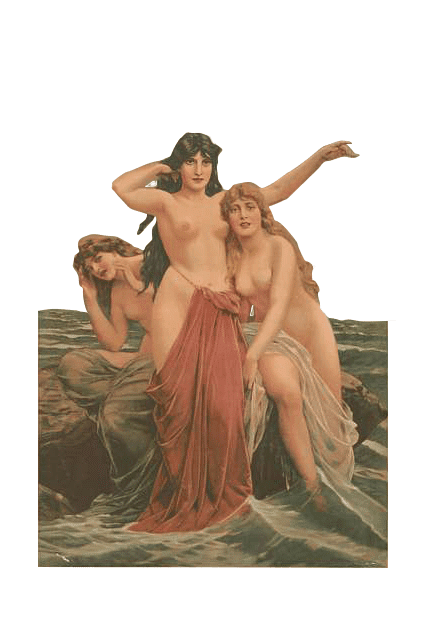
1) Odysseus and other characters often express or demonstrate conflicting emotions, desires, and goals. How do we address strong and conflicting desires in ourselves? Discuss conflicting desires in yourself and your strategy for managing them so that you can achieve your goals.
2) Why did Odysseus not stay among the lotus-eaters? What might the lotus-eaters represent for us in the 21st century?
3) After Odysseus and his men have their fill of goats and wine, why does he lead them further into the island? Why does Odysseus need to see the Cyclops, and why does he feel the need to ultimately reveal to him his true name? Have there been times in your life when you acted against your better judgment? What was your reasoning?
4) Are the shades in the underworld (Book 11) monsters or humans? Why do we see shades of women and mothers first? How does the idea of an afterlife and death influence the way these characters live? In what way might a long life be preferable to immortality?
5) How does Odysseus contrive to hear the sirens’ song unharmed, and why does he risk death here while he did not risk addiction on the isle of the lotus-eaters? How are the temptations of beautiful sirens, or even seeing the Cyclops, different from the temptations of intoxicating drugs? How do you prioritize which goals are worth taking risks for?
Building Bridges
A Recommended Pairing
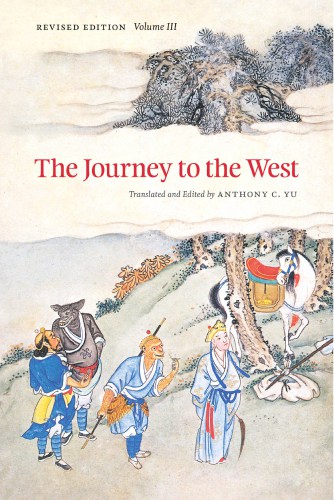
Consider pairing Homer’s Odyssey (8th Century BCE) with Wu Cheng’en’s Journey to The West (16th Century CE).
The Odyssey and Journey to The West are both windows into worlds that are not our own. They each provide examples of how human beings tell stories and carry memories. Like the Odyssey, Journey to The West is an adventure narrative. Students will find it thrilling to consider the relationships across these texts in characters like Tripitaka and Telemachus, who are each trying to find their place in the world, and Monkey and Odysseus, who each struggle to balance their desire to distinguish themselves with a longing to belong. As the Greek world of the Odyssey precedes and prefigures the classical age of Greece, Monkey precedes and prefigures the modern Chinese imperial age. Both texts remain vitally important to the cultures who claim them, and are unique in their lasting influence on both “high” culture and popular culture. As The Lord of The Rings is to The Odyssey, Dragon Ball Z is to Monkey.
Supplemental Resources
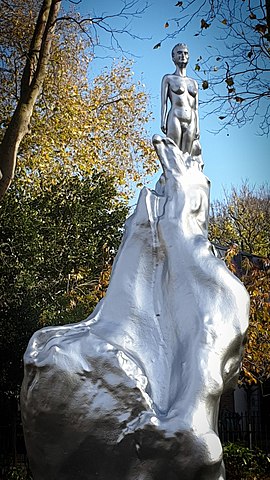
A Sculpture to Mary Wollstonecraft in Newington Green, London. It was sculpted by British artist Maggi Hambling. It was unveiled on November 10, 2020.By Grim23 - Own work, CC BY-SA 4.0
What did Mary Wollstonecraft write about in A Vindication of the Rights of Woman?
Dangerous Minds Episode 4 - Mary Wollstonecraft
Text Mapping
Discipline Mapping
English/Composition Studies
Humanities
Communication Studies
Page Contributor



